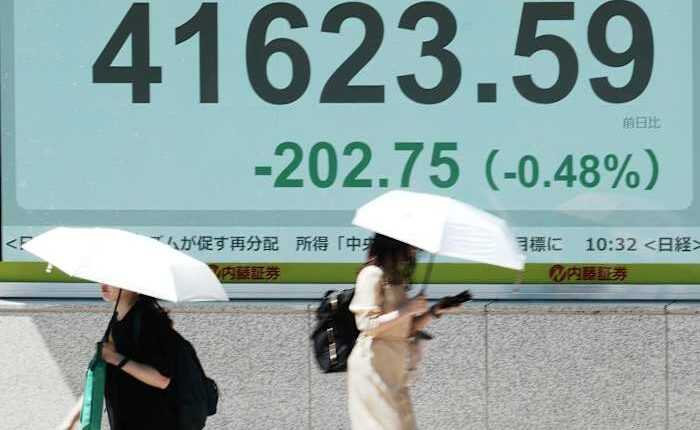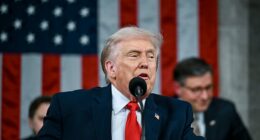Share this @internewscast.com

MANILA – Asian stock markets experienced a downturn on Friday, following slight gains on Wall Street. This was due to a rise in Alphabet and artificial-intelligence shares, which managed to counterbalance a significant decline in Tesla’s stocks.
Japan’s Nikkei 225 index dropped by 0.7% to reach 41,511.09, ending a two-day streak of gains. This came after President Donald Trump revealed a trade agreement imposing a 15% tariff on imports from Japan, significantly lower than the previously mentioned 25% rate scheduled to begin on August 1.
New data released on Friday indicated that Tokyo’s inflation rate increased by 2.9% in July compared to the previous year, a slight decrease from 3.1% in June. ING Economics commented that the Japanese government’s efforts to control inflation are yielding results, although fundamental price pressures in Tokyo remain high. They anticipate the Bank of Japan will keep interest rates unchanged at their meeting on July 30-31, but they also expect the bank to increase its inflation forecast.
In the Chinese markets, Hong Kong’s Hang Seng shed 1.1% to 25,383.07 and the Shanghai Composite index slid 0.3% to 3,593.38.
On Thursday, China and the European Union issued a joint call to action on climate change during an otherwise tense bilateral summit in Beijing riven with major disagreements over trade and the war in Ukraine.
Next week, U.S. Treasury Secretary Scott Bessent has said he will meet with Chinese officials in Stockholm, Sweden, to work toward a deal with Beijing ahead of a tariff truce that expires on Aug. 12. Trump has said a China trip “is not too distant” as trade tensions ease.
“One big question for markets is whether the tariff ceasefire is extended. We expect that an agreement will be attainable, but, in the interim, markets will watch closely to see if there are adjustments to current tariff rates in either direction,” ING Economics said.
In South Korea, the Kospi picked up 0.3% to 3,199.91, while Australia’s S&P/ASX 200 shed 0.4% to 8,673.80.
Taiwan’s Taiex dropped 0.1% and in India, the Sensex fell 0.1%.
On Thursday, the S&P 500 added 0.1% to its all-time high set the day before, closing at 6,363.35. The Dow Jones Industrial Average fell 0.7% to 44,693.91, while the Nasdaq composite rose 0.2% to a record 21,057.96.
Alphabet climbed 1% after the company behind Google and YouTube delivered a fatter profit for the latest quarter than analysts expected. It’s leaning more into artificial-intelligence technology and said it’s increasing its budget for AI chips and other investments this year by $10 billion to $85 billion.
That helped push up other stocks in the AI industry, including a 1.7% rise for Nvidia. The chip company was the strongest single force lifting the S&P 500 because it’s the largest on Wall Street in terms of value.
But an 8.2% drop for Tesla kept the market in check. Elon Musk’s electric-vehicle company reported results for the spring that were roughly in line with or above analysts’ expectations, and Musk is trying to highlight Tesla’s moves into AI and robotaxis.
The focus, though, remains on how Musk’s foray into politics is turning off potential customers, and he said several rough quarters may be ahead as “we’re in this weird transition period where we’ll lose a lot of incentives in the U.S.”
Stocks have broadly been rallying for weeks on hopes that President Donald Trump will reach trade deals with other countries that will lower his stiff proposed tariffs, along with the risk that they could cause a recession and drive up inflation.
In other dealings on Friday, U.S. benchmark crude oil added 13 cents to $66.16 per barrel. Brent crude, the international standard, rose 12 cents to $68.48 per barrel.
The U.S. dollar edged higher to 147.21 Japanese yen from 147.00. The euro fell to $1.1737 from $1.1748. ___
AP Business Writer Stan Choe contributed.
Copyright 2025 The Associated Press. All rights reserved. This material may not be published, broadcast, rewritten or redistributed without permission.











